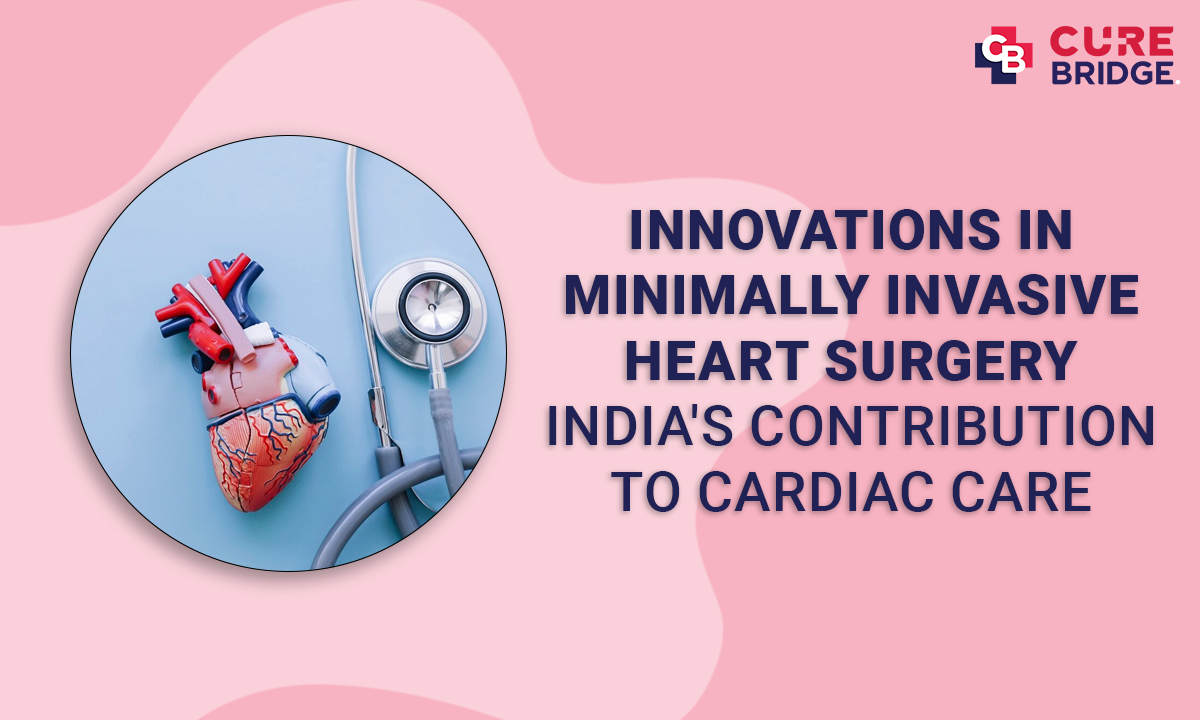
Innovations in Minimally Invasive Heart Surgery: India’s Contribution to Cardiac Care
Introduction
Today, cardiovascular diseases have become a leading cause of death around the world, with a significant impact on public health. In response to this global health challenge, medical professionals and researchers have been working tirelessly to advance treatment options. Minimally invasive heart surgery is one such innovation that has transformed cardiac care.
India, with its burgeoning healthcare industry and a pool of skilled medical professionals, has made significant contributions to the field. In this blog, we will look at the innovations in minimally invasive heart surgery and India’s valuable contributions to this life-saving approach.
What is Minimally Invasive Heart Surgery?
Minimally invasive heart surgery, often referred to as “keyhole” surgery, involves performing cardiac procedures through small incisions rather than the traditional open-heart surgery that requires a large chest incision. This approach offers benefits like shorter recovery times, reduced pain and scarring, and a lower risk of infection. Patients also experience less trauma to their bodies, allowing for a quicker return to normal life.
India’s Role in Advancing Minimally Invasive Heart Surgery
Pioneering Surgeons
India boasts a cadre of highly skilled and experienced cardiac surgeons who have been at the forefront of innovating and perfecting minimally invasive techniques. Dr. K. R. Balakrishnan, Dr. Devi Shetty, and Dr. Ramakanta Panda are some of the leading names in this field. They have played a pivotal role in training the next generation of cardiac surgeons and conducting research to refine these procedures.
Cost-Effective Healthcare
The cost-effectiveness of Indian healthcare contributes significantly to the success of minimally invasive heart surgery. The country has established itself as a medical tourism hub, offering high-quality cardiac care at a fraction of the cost compared to Western countries. Because of this accessibility, patients from around the world can benefit from advanced cardiac procedures without breaking the bank.
Innovative Techniques
Indian cardiac surgeons have developed innovative techniques and tools that have revolutionized minimally invasive heart surgery. For example, “beating heart” surgery, where the heart continues to beat during the procedure, has been perfected by Indian surgeons. This technique minimizes the need for a heart-lung machine, reducing the risks associated with its use.
Research and Education
Leading Indian medical institutions like the All India Institute of Medical Sciences (AIIMS) and the Postgraduate Institute of Medical Education and Research (PGIMER) have been conducting groundbreaking research in the field of minimally invasive heart surgery. This research includes developing new materials, instruments, and surgical procedures that further enhance patient outcomes.
Notable Innovations in Minimally Invasive Heart Surgery
Robotic-Assisted Surgery
Indian hospitals have embraced robotic-assisted surgery as a minimally invasive technique. The da Vinci Surgical System is widely used for complex cardiac surgeries, providing surgeons with enhanced precision and control.
Hybrid Procedures
Indian surgeons have pioneered the concept of “hybrid” procedures, which combine traditional open-heart surgery with minimally invasive techniques. This approach helps treat complex cardiac conditions that were previously considered inoperable.
Transcatheter Valve Replacement
Transcatheter aortic valve replacement (TAVR) and transcatheter mitral valve repair (TMVR) are minimally invasive procedures for heart valve diseases. Indian cardiologists have gained international recognition for their expertise in these techniques, offering new hope to patients who were once considered too high-risk for surgery.
Off-Pump Coronary Artery Bypass Surgery
Indian cardiac surgeons have excelled in performing off-pump coronary artery bypass surgery, which involves bypassing blocked arteries without stopping the heart. This reduces the risk of complications and shortens recovery times.
Final Words
Minimally invasive heart surgery is a game-changer in cardiac care, offering patients a less traumatic and more efficient treatment option. India’s significant contributions to the field are a testament to the country’s commitment to providing accessible and cutting-edge healthcare. As research continues and technology evolves, India can expect even more remarkable developments in this critical field of medicine.
Curebridge, home to several of India’s most excellent cardiologists, is committed to conforming to India’s growing healthcare policies. Curebridge assures that its Cardiology practices, led by the best cardiologists in India, adhere to the most recent norms and regulations by remaining at the forefront of these policies. This commitment to improving the quality of care offered to patients has a global influence by serving as a model for healthcare practices worldwide.
Curebridge’s expertise benefits patients from all over the world, as the institution’s unwavering commitment to compliance and innovation, driven by the best cardiologists in India, creates new standards in Cardiology, providing hope and healing to people worldwide.
